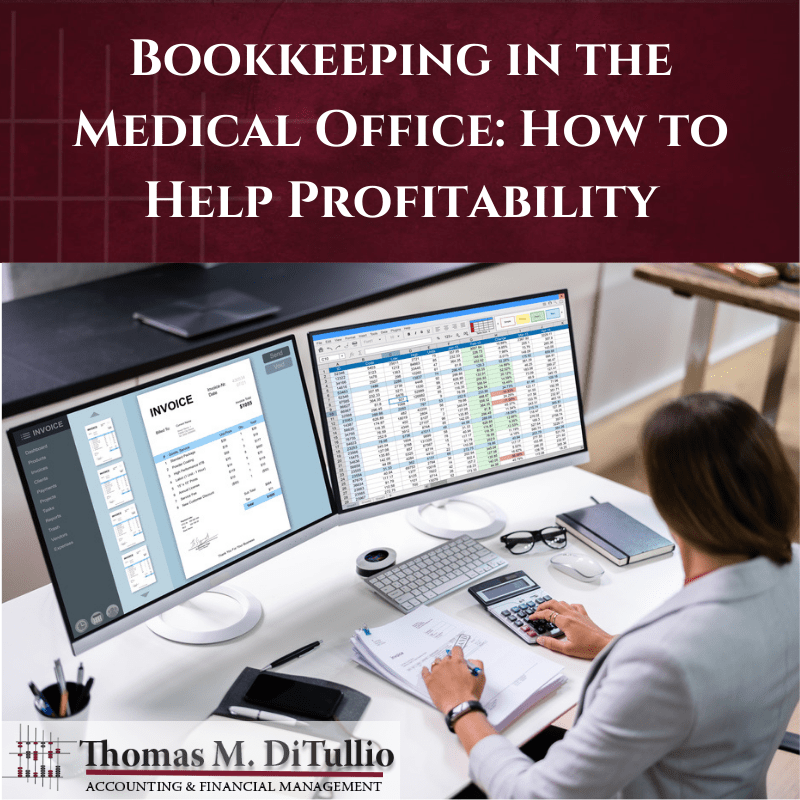4 Healthy Accounting Tips for Your Medical Practice
As a physician, the main focus in your practice is on providing high-quality patient care. However, it still makes sense to pay careful attention to your medical practice’s accounting. While you are a doctor, you are also a business owner who strives to operate a profitable practice. Making sure that your practice is successful and highly profitable requires you to keep accurate financial records so that you can see areas where your practice might need tightening. It is also critical for ensuring that you remain compliant with the relevant state and federal tax laws. Here are four accounting tips from TMD Accounting to help you keep your medical practice financially healthy.
-
Be Careful When Choosing Your Accounting Software.
Many doctors are unsure which accounting software they should use for their medical malpractices. You might think that all accounting software is basically the same and to simply choose the cheapest software you can find. Some doctors rely on spreadsheets, believing they are cheaper and easier to use.
However, trying to keep track of everything on spreadsheets can mean that you are expending too much labor costs and effort, and it can also result in simple inputting errors. Spreadsheets can also make it difficult for you to review your financial information and make fully informed forecasts about your practice’s future.
Choosing the cheapest accounting software off the shelf might also not be the best idea. You need to find software that is relevant to medical practices. When you choose the right accounting software, it can reduce your need to expend added effort, provide you with a better insight into your practice’s profitability, make the tax season easier, and allow you to share information with your accountant via the cloud.
The best way to find the right software for your medical practice is to talk to your accountant and ask for suggestions. At TMD Accounting, we work with many different types of accounting software every day, and we can provide some suggestions about which one will work best for your business.
-
Choose the Right Accounting Method for Your Medical Practice.
As a medical practice, you can choose from one of two types of accounting methods for your business, including cash basis accounting or cash accrual accounting. In most cases, your practice manager, administrator, or accounting firm will pick the type of accounting that will work best for your medical practice.
No matter which type of accounting method your practice uses, it is critical that your manager has a deep level of understanding of how the chosen method works and the applicable financial terminology used while performing day-to-day operations.
Cash Basis Accounting Method for Medical Practices
If your medical practice uses the cash basis accounting method, you will account for expenses at the time that they are paid. Account receivables will be counted when you receive payments. Most physician-owned medical practices prefer the cash basis accounting method.
If you are using this method, you will receive your payment on a predetermined schedule after all of your practice’s expenses have been paid. It is important for your manager to also think about larger expenses, including your malpractice insurance. Since these types of expenses are normally paid each quarter, it is important for your manager not to distribute money that should be earmarked for these quarterly expenses.
Accrual Accounting Method for Medical Practices
If your practice uses the accrual accounting method, expenses will be accounted for as soon as you receive the bills instead of when they are paid. You will also account for your receivables at the time you send a bill to a patient instead of when you actually receive the payment.
Under this accounting method, your income will have already been accounted for at the time your patients pay their bills. Most medical practices do not use the accrual method because of its difficulty. However, the accrual method of accounting might provide a more accurate picture of the health of your practice at any point in time.
-
Schedule Profit and Loss Statements
One accounting tip that medical malpractices can borrow from how big businesses conduct accounting is to produce profit and loss statements on a quarterly basis. Depending on your medical practice’s size, your profit and loss statement can be fairly simple or quite complex.
Producing profit and loss statements can be an effective way for you to quickly check the overall financial health of your medical practice. Profit and loss statements help by validating your practice’s daily records, identifying discrepancies, and providing insight into your practice’s patient flow and where you might want to invest money in your business.
While profit and loss statements can be invaluable, most medical practices do not use them because of having fairly simple business models. However, producing profit and loss statements each quarter can provide you with important insight and can be a powerful tool to use for your practice.
-
Choose the Right Accountant for My Small Business
Many doctors who have their own medical practices are very busy and find accounting to be overwhelming and confusing. If your practice is very busy, your office manager might also have his or her hands full and feel overwhelmed by the practice’s accounting needs. Hiring the right accountant can help to simplify your practice’s accounting and ensure that you understand exactly where your practice is at financially and areas in which improvements can be made.
At TMD Accounting, we offer experienced small business accounting services for medical practices. When you work with us, you can focus on delivering the best level of care to your patients while we handle your accounting. Our accounting services are comprehensive and scalable, and we can customize your services to meet the particular needs of your medical practice. Some of the types of services we offer include accounting and bookkeeping for medical practices, tax preparation, medical practice controller services, and more. To learn more about how we can help with your accounting needs, contact us today to schedule a consultation at 1-856-228-2205.





